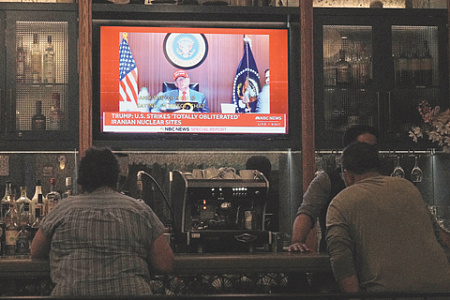
In an unprecedented move against American media institutions, President Donald Trump has threatened to revoke the broadcasting licenses of two of the nation’s oldest and most prominent television networks, ABC News and NBC News. The White House occupant accused the broadcasters of being overly critical of his administration and acting as an arm of the Democratic Party, escalating the long-simmering tensions between the presidency and the press to a new level.
Writing on his Truth Social platform, Trump labeled the networks “FAKE NEWS” and claimed they produce “97% BAD NEWS” about him. He declared they are “merely a tool of the Democratic Party” and that their licenses should be challenged or, alternatively, they should be forced to pay “a large sum,” potentially millions of dollars annually, for their use of the licensed broadcast spectrum. This financial penalty echoes a previous proposal by billionaire Elon Musk, who has since become an opponent of the current administration.
However, Trump’s threat faces significant legal and institutional barriers. In the United States, broadcast licenses are granted and reviewed by the Federal Communications Commission (FCC), an independent federal agency designed to operate outside of direct government control. While a president has influence over the FCC’s composition, he does not possess the legal authority to unilaterally order the commission to revoke a media outlet’s license. According to American studies expert Pavel Sharikov, any such attempt would almost certainly be defeated in court, as the networks could argue it was a form of political retaliation.
The President’s latest salvo appears to have been an emotional reaction to recent programming. It followed network coverage supporting former national security advisor John Bolton and, more directly, a highly critical ABC News interview with former New Jersey Governor Chris Christie. Christie, a fellow Republican, defended Bolton and sharply criticized Trump, likely prompting the President’s fiery response against the two media giants, whose histories span nearly a century.
This incident is not an isolated event but part of a broader, systematic campaign against critical media during Trump’s second term. Since his inauguration, the administration has altered long-standing norms, such as seizing control over the formation of the presidential press pool from journalists. Furthermore, Pentagon chief Pete Hegseth reportedly removed correspondents from media outlets deemed disloyal to the President, while an executive order signed in May aims to cease federal funding for public broadcasters NPR and PBS, citing a lack of “fair, credible, and impartial” coverage.
Beyond administrative pressure, Trump has consistently used litigation as a weapon against news organizations. In December 2024, he reached a $15 million settlement with ABC News after a host incorrectly stated he had been convicted of rape, rather than found liable in a civil sexual abuse case. He also successfully sued CBS News, securing a $16 million compensation over an edited interview with his political rival, Kamala Harris.
This aggressive posture creates a potent irony in American politics. Trump, who built a political platform accusing his opponents of stifling free speech through social media censorship, is now wielding the power of the presidency to challenge the very freedom of the press he once claimed to champion, blurring the lines between the accuser and the accused.
